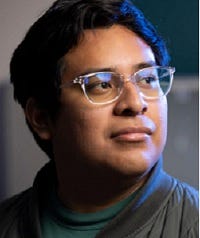Generative AI Use Leading to New Types of High-Paying Jobs
‘Prompt engineers’ can get $300,000; tech workers tuning resumes to emphasize AI work; creative ways to learn AI skills being tried
By John P. Desmond, Editor, AI in Business

The introduction of generative AI about a year ago has fueled the growth of new job types paying high salaries.
“Prompt engineers” might be offered $300,000 at companies with 1,000 or more employees, according to results of a recent survey conducted by ResumeBuilder. The company surveyed 1,187 business leaders; 91 percent were looking for ChatGPT experience.
Of responding companies, 29 percent reported that they would be hiring prompt engineers this year. Some 66 percent reported a belief that hiring for ChatGPT experience will give their firms a competitive edge, such as in reduced labor costs.
“By hiring a prompt engineer, who can impact all the departments within an organization, a company can save on labor and resource costs,” stated Chief Career Advisor Stacie Haller of ResumeBuilder. “Given this, and the fact it’s not a highly available skill yet, it’s understandable that these positions can demand six figures at the entry-level.”
A recent report from LinkedIn on Global Talent Trends found that jobs mentioning AI over the past two years have attracted 17 percent more engagement from candidates than posts not mentioning AI.
“Candidates are savvy. They’re showing they want to go where opportunities are,” stated Erin Scruggs, VP of Global Talent Acquisition for LinkedIn. “I would consider it a requirement for most companies to share at least a basic roadmap of their AI strategy in job posts to keep up with the market.”
Interest in AI jobs is picking up across industries and geographic regions, with interest from workers in the UK, Germany and France higher than the average. “These job posts vary from roles where professionals will directly work on AI development, such as AI engineer, to job postings where AI is listed as a required skill — for example a digital product manager or a cybersecurity consultant,” stated Olivier Sabella, VP of LinkedIn Talent Solutions for EMEA (Europe, the Middle East and Africa) and LATAM (Latin America), in an account from CNBC Make It.
Global Workforce Quickly Adding AI Skills to Resumes
More than 50 percent of professionals globally report wanting to learn more about AI, and many of them are reporting they know how to work with AI-based tools and products. “The pace at which LinkedIn members added AI skills to their profiles has nearly doubled since the launch of ChatGPT alone,” Sabella stated. Since early 2016, the amount of people who say they have AI skills has increased ninefold, he added.
Another approach for workers is to “rebrand” as an AI expert. That’s what Zac Brown did. After looking for jobs in 2022 based on work he had been doing in software engineering, he started seeing the AI opportunity. So he updated his resume to emphasize the AI-related work he had been doing.
“This is a rough time to be a regular software engineer,” he said in a recent account in Vox. “I was a software engineer, because that’s what I always was,” Brown stated. “I realized this last time I was looking, you have to highlight the AI that you’ve got, because that is what’s attractive to companies right now.”
One of Brown’s previous employers gave him the opportunity to work with machine learning and AI, to help fill in his skills gap. He sees boot camps and online courses as a good way to be introduced to AI skills, but working on projects is the best way to learn.
“A lot of that is going to come in actually doing it, actually working on these systems, messing it up, making mistakes, learning from those, and pushing forward,” he stated.
Jobs in AI Pay Well
Data from the compensation software company Payscale quoted in the Vox account showed jobs with AI skills paid an average of 27 percent more than other tech jobs. The median annual salary for an AI engineer was $243,000 in May, according to the Levels.fyi tech career comparison site, compared with $166,750 for non-AI engineers. And the A.Team firm that connects groups of tech talent with companies seeking services reported that 30 percent of its new pipeline was AI-related, a five-fold increase over the previous quarter.
In another example from the Vox account, a software developer in North Carolina, Taylor, who did not want his full name to be used, plans to moonlight at a friend’s AI startup, where he hopes to learn from an engineer experienced in machine learning. “It’ll either help me more in my current job or help me get the next job,” he stated.
Another approach is to do-it-yourself, anticipating where the market will go and trying to position for it. Eric Larney, a customer data product manager quoted in the Vox account, decided to focus on AI and cybersecurity. He used a document from the International Association of Privacy Professionals for guidance. The organization has announced its intention to provide certification and training for AI governance professionals.
“It’s not so much that the transition is relying on a gap that’s in my current career; it just doesn’t really exist yet as a function,” Larny stated. “I see this as a place where people, who are able to get on board early and learn some of these frameworks and apply this governance mindset, have an opportunity to really do some good work.”
Even those experienced in high-tech jobs on the cutting edge are making an effort to learn more about AI. Nitin Pathak, a data scientist at Microsoft, got a six-month professional certification in machine learning and AI from Berkeley, in order to perform better at his job, according to the Vox account. “It really helped me draw those connections between machine learning and AI concepts, and which models would make sense for different business situations,” he stated.
“I’ve been working in technology for several decades, and in today’s world, it’s so clear that we’ll all have many careers,” he added. “I love technology and I don’t want to be obsolete. I want to be on the cutting edge.”
José Tapia Won a Scholarship From AWS
AI can present opportunity to some with less than all the advantages in life as well. For example, José “Pepe” Tapia had a 2.0 GPA in high school and no sense of direction. He enrolled in community college but dropped out; he couldn’t afford it and did not know how to apply for financial aid. Of Mexican heritage, his father is a landscaper and his mother works as a housekeeper. Tapia got a job in retail, made some bad decisions, and got in trouble with the law.
Fortunately, he hung onto his girlfriend. She graduated from UCLA about a decade later, setting a good example. “My girlfriend was the light I needed to believe in myself again,” stated Tapia, who has four siblings and grew up in Escondido, in a recent account in California State Fullerton News.
In 2019, Tapia enrolled at Palomar College in San Diego County and earned associate degrees in computer science and mathematics. He became the first in his family to graduate from college. He transferred to CSUF in the fall of 2021 to major in computer science. In May of this year, he was on track to be the first in his family to earn a bachelor’s degree.
In the summer of 2022, Tapia was introduced to AI and machine learning research through ASSURE-US, a $1.5 million National Science Foundation-funded grant program to boost the number of Hispanic students in STEM careers. Since 2018, the grant program has served more than 1,000 CSUF College of Engineering and Computer Science students from underrepresented backgrounds.
Tapia’s participation in the ASSURE-US summer program was the catalyst that led him to his current research projects. “Being involved in computer science research has empowered me to take ownership of whatever it is I am working on,” Tapia stated. “Having ownership in a product provides a level of understanding and appreciation for the success of a team.”
To further support hands-on learning, Tapia received the AWS Artificial Intelligence (AI) and Machine Learning (ML) Scholarship from Amazon and a California State University Edison STEM-NET Student Research Fellowship.
Through Amazon’s scholarship program to prepare underrepresented students for careers in AI and machine learning, Tapia is working on a project to develop a low-cost recording software device. The “EPAL Project” live streams video to the cloud to bring families together to watch a sports game live or after the game.
Read the source articles and information from ResumeBuilder, LinkedIn, CNBC Make It, Vox and California State Fullerton News.
(Write to the editor here; tell him what you want to read about in AI in Business.)
Click on the image to buy me a cup of coffee and support the production of the AI in Business newsletter. Thank you!







